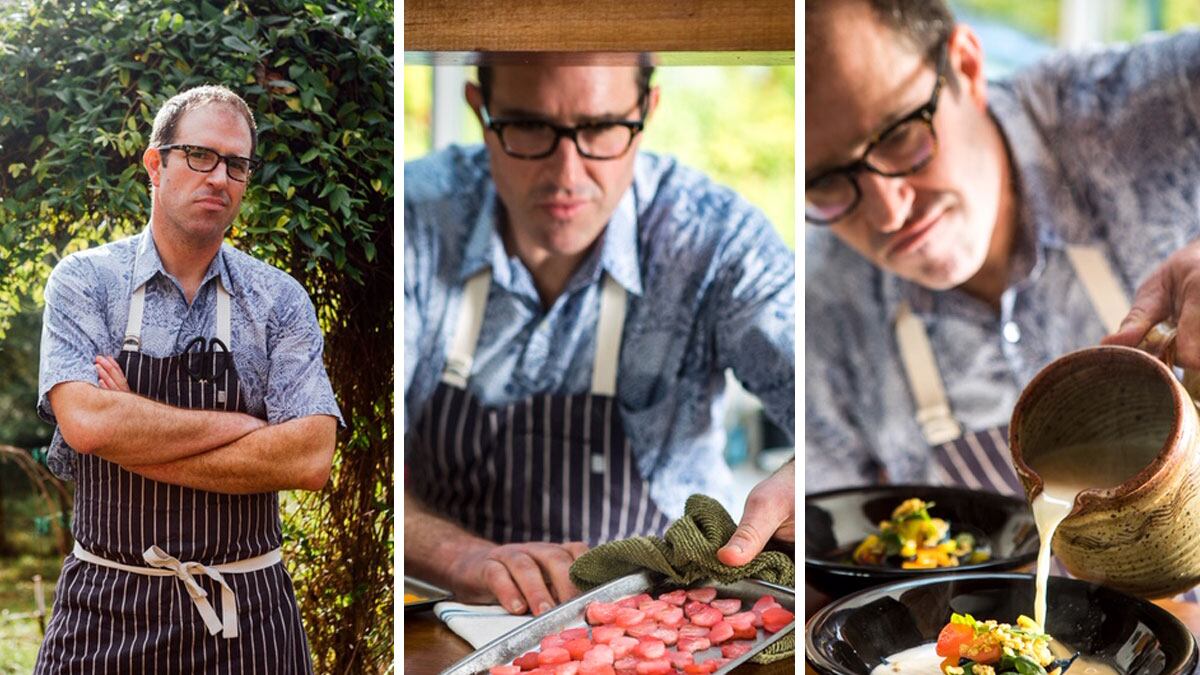By 2015, Leather Storrs had hit a wall.
After returning to Portland in 1999, following stints in kitchens in Northern California, the chef experienced both swift success and crushing failure. He made his name in the city's food scene by elevating Noble Rot, the innovative East Burnside wine bar, to critical acclaim, earning a visit from The New York Times and the title of Restaurant of the Year from Willamette Week in 2004.
But then he stumbled.
With Rocket, Storrs broke off on his own, crafting odd, impossible-to-categorize dishes, like carrot pancakes in ground lamb sauce. The avant-garde cuisine satisfied only Storrs' sense of humor and bravado, and the concept was lost on diners and critics. The restaurant closed in 2008 after only two years. Storrs eventually returned to Noble Rot, where he watched friends and colleagues like Naomi Pomeroy, Andy Ricker and Kurt Hoffman become household names.
Now, however, Storrs, 47, believes he's found the path to the broader acclaim he's long been chasing: cannabis.
"When I revisited cooking with weed, I realized I could do the kind of food that excited me," Storrs says. "The things that make me, the things that I like—food, words and playing with the two—reach their apex with the addition of weed."
When Oregon legalized recreational cannabis in 2014, a specific demand for culinary whimsy emerged, as did customers with appetites for a combination of fun and food. It's a niche Storrs was uniquely qualified to fill. His attention to detail and tendency to overthink made him an ideal chef for crafting dishes with controlled, consistent doses that actually taste good—edibles that restore the trust broken by nightmarishly potent brownies of yore. He also knows how to make people laugh, which is the first step in breaking in a dinner table of strangers scared to get too high.
In 2015, Storrs teamed with friends Chris Angelus of Portland Food Adventures, Natalia Toral, and Pono Brewing's Erick Russ to launch a series of infused gourmet dinners under the banner Kitchen Chronicles. The menus feature meringues shaped like blunts, burnt on one end and served in glass ashtrays, and infused fois gras in peach fruit leather resembling slabs of shatter. In a spin on Lucky Charms, radishes are cut into little hearts, turmeric potatoes serve as the yellow moons, oxalis are the four-leaf clovers, and blue stars are cabbage cooked with iron in a Japanese pickling technique that creates a blue hue. He adds Rice Krispies toasted with cilantro oil, so that when infused thai coconut chicken broth is poured into the bowl, the rice pops and crackles. Often, every face at the table lights up.
"Because they're high, people get it," Storrs says. "When I did stuff like this at Rocket, people looked at the $15 price and were like, 'Eh.'"
The biggest dose of THC (5 mg) is delivered via a neat cocktail, to help guests feel the effects while they're still at dinner and experience a more collective high together. Appetizers are one-half to 1 mg THC each, and the plates are CBD-dominant from there.
"For someone who has never been moderate in their life, someone who's had problems with alcohol, I take my role as a shepherd very seriously," Storrs says. "I'd rather have people come away feeling like they could've had a couple more."
Over the past few years, Storrs has hosted dinners up and down the West Coast and beyond. He's plotting a line of gourmet edibles, including an infused hot chocolate and caramel sauce named Wezz—featured in the most recent issue of Kitchen Toke—and a CBD granola bar.
But Storrs believes television is where he can make his greatest impact.
In 2016, he got his first taste of TV in the form of an invitation to a competitive episode of Vice's Bong Appetit. He knew it wasn't exactly a star-making moment, but he did assume he'd have a win in the bag. His confidence struck again.
"I went down there and looked at the guys as total jokers—I even helped the guy who ended up winning when he was burning something," Storrs says. "My plate was fussy Portland stuff, all topographical and yogurt this and lentil that in earthenware. He's got lamb chops with banana chutney, and they're going nuts for it. Again, you have to remember your audience, which was Wiz Khalifa, who 'doesn't like seafood.'"
But the experience showed him TV is where he could reach broad audiences. He calls his dream gig The Weediest, a travel show in the vein of Anthony Bourdain's No Reservations, centering on people doing interesting things with food, weed and/or alcohol in legal states, always ending with a dinner party. There's nothing quite like that right now. But the TV executives he's spoken to so far weren't "ready for it," he says.
If he does find a place on air, the question would be whether Storrs' endearingly scruffy personality would translate. But given that the best cooking shows are woven with culture and controversy, and hosts can reach the heights of fame in an instant, Storrs seems as likely a candidate as any to become legal weed's first celebrity chef.
"Maybe I'm too white or too male or too old," says Storrs. "But I think I have something to offer and something to say that people would want to hear."
